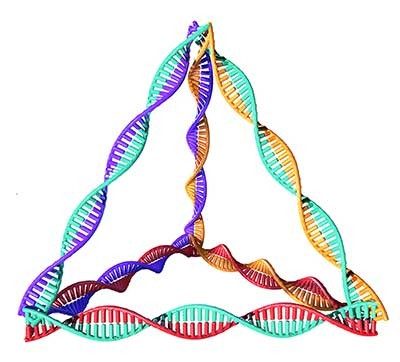FOR IMMEDIATE RELEASE
ACS News Service Weekly PressPac: November 10, 2021
Reversing new-onset type 1 diabetes with pyramid-like DNA
“Tetrahedral Framework Nucleic Acids Reverse New-Onset Type 1 Diabetes”
ACS Applied Materials & Interfaces
Usually diagnosed in children, teens and young adults, type 1 diabetes is an autoimmune disease in which the immune system attacks and destroys insulin-secreting β-cells in the pancreas. As a result, people with type 1 diabetes can’t regulate their blood sugar levels and require insulin treatment for survival. Now, researchers reporting in ACS Applied Materials & Interfaces have reversed new-onset type 1 diabetes in mice with pyramid-like DNA molecules called tetrahedral framework nucleic acids (tFNAs).
About 64,000 people in the U.S. are diagnosed with type 1 diabetes each year, according to the Juvenile Diabetes Research Foundation. There is no cure for the disease, and to manage symptoms, people must measure their blood sugar levels throughout the day and administer insulin through an injection or pump. Although scientists still don’t know exactly what causes the body to turn against itself and attack insulin-secreting cells, people with type 1 diabetes have fewer regulatory T cells (Tregs) — immune cells that suppress the differentiation and activation of other, self-attacking T cells. In a recent study published in ACS’ Nano Letters, Yunfeng Lin and colleagues showed that treating mice with tFNAs could prevent type 1 diabetes, in part by increasing Treg numbers. Originally designed to carry other therapeutic molecules into cells, tFNAs have recently been shown to modulate the immune system on their own. Now, the researchers wanted to find out if these molecules could reverse new-onset type 1 diabetes, before pancreatic β-cells were completely destroyed.
The researchers made tFNAs from four single-stranded DNA segments that self-assembled into pyramid-like shapes, called tetrahedrons. But whereas a pyramid is square at its base, tetrahedrons are triangular. Then, every other day for 4 weeks, they injected the tFNAs into 10 mice with new-onset type 1 diabetes, while 10 other diabetic mice were injected with saline. In the control mice, blood glucose levels continued to rise, and 60% of the mice died during the 12-week follow-up period. In contrast, blood glucose levels in mice treated with tFNAs went down to normal levels, and none of the rodents died. In a further analysis of the tFNA-treated mice, the team found that pancreatic β-cells were protected, and Tregs were restored to normal levels, while auto-reactive T cells decreased in the pancreas. Although the findings still need to be verified in people, tFNAs are one of the most promising candidates for type 1 diabetes immunotherapy, the researchers say.
The authors acknowledge funding from National Key R&D Program of China and the National Natural Science Foundation of China.
###
The American Chemical Society (ACS) is a nonprofit organization chartered by the U.S. Congress. ACS’ mission is to advance the broader chemistry enterprise and its practitioners for the benefit of Earth and all its people. The Society is a global leader in promoting excellence in science education and providing access to chemistry-related information and research through its multiple research solutions, peer-reviewed journals, scientific conferences, eBooks and weekly news periodical Chemical & Engineering News. ACS journals are among the most cited, most trusted and most read within the scientific literature; however, ACS itself does not conduct chemical research. As a leader in scientific information solutions, its CAS division partners with global innovators to accelerate breakthroughs by curating, connecting and analyzing the world’s scientific knowledge. ACS’ main offices are in Washington, D.C., and Columbus, Ohio.
To automatically receive press releases from the American Chemical Society, contact newsroom@acs.org.
Note: ACS does not conduct research, but publishes and publicizes peer-reviewed scientific studies.
Media Contact
ACS Newsroom
newsroom@acs.org

View larger image

